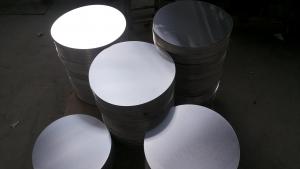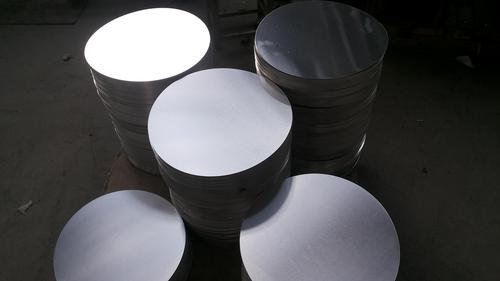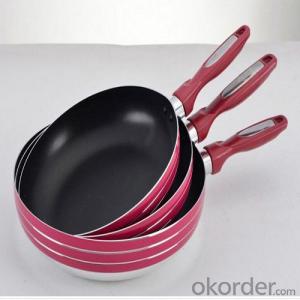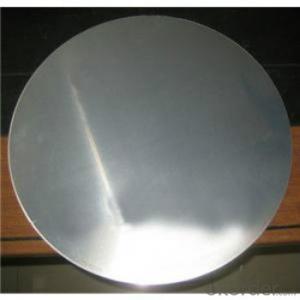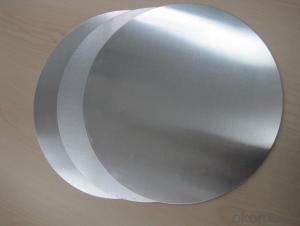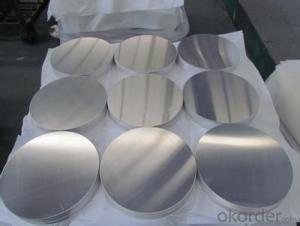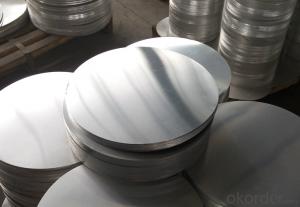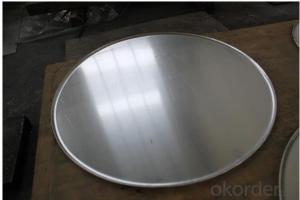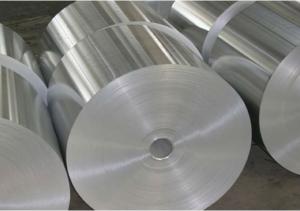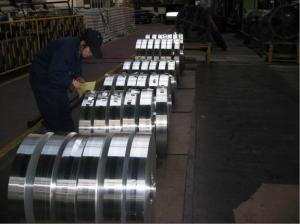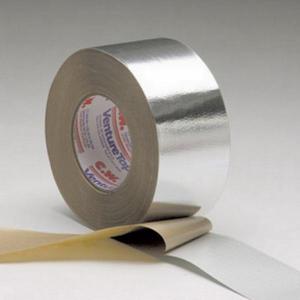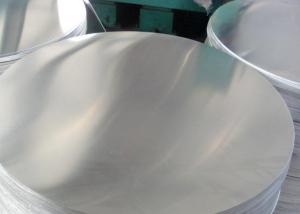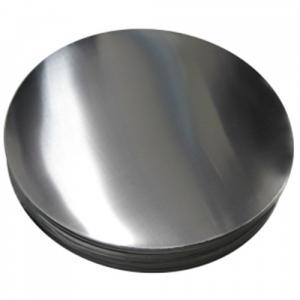Aluminum Circle for Cooking
- Loading Port:
- China Main Port
- Payment Terms:
- TT OR LC
- Min Order Qty:
- -
- Supply Capability:
- 300000 m.t./month
OKorder Service Pledge
Quality Product, Order Online Tracking, Timely Delivery
OKorder Financial Service
Credit Rating, Credit Services, Credit Purchasing
You Might Also Like
Specifications
1) aluminum circle for cooking utensils
2) Temper O, H22
3) Thickness 0.3-6.0mm
4) Width 90-1000mm
5) mini order aceept
aluminum circle for cooking utensils
| 1.Specifications: | |||||||||||||
| Name:Aluminium Circles | |||||||||||||
| Alloy:1050,1060,1070,1100,3003 | |||||||||||||
| Temper:HO,H12,H14,H16,H18,H22,H24,H26 | |||||||||||||
| Thickness:0.55mm-5.50mm | |||||||||||||
| Diameter:88mm-950mm | |||||||||||||
| MOQ:0.20metric tons per size,5 metric tons per order | |||||||||||||
| Package:Sea-Worthy Wooden package/case,with paper interleave,plastic film before wooden package;20-25metric tons per 20feet container | |||||||||||||
| 2.Chemical Composition(%) | |||||||||||||
| Chemical Composition (WT.%) | |||||||||||||
| Alloy | Min.AL | Si | Fe | Cu | Mn | Mg | Cr | Ni | Zn | Ca | |||
| 1050 | 99.5 | 0.25 | 0.4 | 0.05 | 0.05 | 0.05 | --- | --- | 0.05 | --- | |||
| 1060 | 99.6 | 0.25 | 0.35 | 0.05 | 0.03 | 0.03 | --- | --- | 0.05 | --- | |||
| 1070 | 99.7 | 0.25 | 0.25 | 0.04 | 0.03 | 0.03 | -- | --- | 0.04 | --- | |||
| 1100 | 99 | 0.95 | 0.95 | 0.05-0.2 | 0.05 | --- | -- | --- | 0.1 | --- | |||
| Mechanical Properties | |||||||||||||
| TEMPER | THICKNESS(mm) | TENSILE STRENGTH | ELONGATION% | ||||||||||
| HO | 0.55-5.50 | 60-100 | ≥ 20 | ||||||||||
| H12 | 0.55-5.50 | 70-120 | ≥ 4 | ||||||||||
| H14 | 0.55-5.50 | 85-120 | ≥ 2 | ||||||||||
| 3.Price:USD2600-3600/MT FOB shanghai,China | |||||||||||||
| 4.Payment term:100% irrevocable LC at sight or TT,30% as deposit;70% before shipping. | |||||||||||||
| 5.Delivery time:within 25 days after received LC or deposit | |||||||||||||
| 6.Price Validity:7 days | |||||||||||||
| 7.Factory Capacity:20000 metric tons per month | |||||||||||||
- Q: This question asks for the typical origins of aluminum in the environment.
- <p>Aluminum is the most abundant metal in the Earth's crust, and it is widely present in the environment. Common sources include: 1) Natural weathering of rocks and soil, which releases aluminum into the environment. 2) Industrial processes such as aluminum production, which can release aluminum into the air and water. 3) Food and water, where aluminum can be found naturally or as a result of contamination. 4) Household products like aluminum foil, cans, and cookware, which can contribute to aluminum exposure. 5) Medications and vaccines, which sometimes contain aluminum as an adjuvant. 6) Cosmetics and personal care products, which may contain aluminum compounds. These sources contribute to the overall aluminum exposure in the environment and to humans.</p>
- Q: This question seeks to understand the impact of aluminum exposure on human health, including potential risks and consequences.
- <p>Aluminum is a common element found in the environment, and while it is generally considered safe, there are concerns about its health effects on humans. High levels of aluminum exposure have been linked to neurological disorders, particularly Alzheimer's disease, although the relationship is not definitively proven. Aluminum can also cause bone diseases and anemia, as it can interfere with the absorption of calcium and iron. Long-term exposure to high levels of aluminum may lead to cognitive dysfunction and memory loss. However, the everyday exposure to aluminum from food, water, and medications is considered safe by health authorities, and there is no need for alarm in normal circumstances.</p>
- Q: Is it possible to utilize aluminum in the creation of innovative electronic devices?
- <p>Yes, aluminum can be used to make new types of electronic devices. Aluminum is a lightweight, corrosion-resistant, and highly conductive material, making it ideal for various electronic components. It's commonly used in heat sinks, casings, and wiring due to its thermal and electrical conductivity. Additionally, aluminum's malleability allows it to be shaped into intricate parts, which can be beneficial for compact and innovative designs in electronics. Furthermore, its abundance and low cost make it an attractive material for manufacturing new electronic devices.</p>
- Q: What is the primary application of aluminum in various industries and everyday life?
- <p>Aluminum is most commonly used in the manufacturing of cans and packaging materials due to its lightweight, corrosion resistance, and recyclability. It is also extensively used in construction for window frames, roofing, and facades. In transportation, aluminum is a key material in the production of vehicles, particularly in the aerospace industry for aircraft and automotive industry for car bodies, due to its strength-to-weight ratio. Additionally, it is used in electrical components and electronics due to its good conductivity and malleability.</p>
- Q: Explain the interaction between aluminum and water, including any chemical reactions or properties.
- <p>Aluminum and water do not react directly under normal conditions. Aluminum is a reactive metal, but it is protected by a thin layer of aluminum oxide that forms on its surface when exposed to air, which prevents further reaction with water. This oxide layer is stable and acts as a barrier, making aluminum resistant to corrosion. However, in certain conditions, such as when aluminum is in contact with water and an electrolyte, it can lead to a process known as electrochemical corrosion. Additionally, aluminum can react with steam at high temperatures to form aluminum oxide and hydrogen gas.</p>
- Q: This question asks about the impact of aluminum on human health when it is consumed through food packaging.
- <p>Aluminum is commonly used in food packaging due to its lightweight and durability. However, concerns have been raised about its potential health effects. Aluminum can leach into food, especially in acidic conditions, and be ingested by humans. While the body naturally excretes some aluminum, excessive intake may lead to accumulation, particularly in the brain, bones, and kidneys. Long-term exposure has been linked to neurological disorders, including Alzheimer's disease, and may contribute to bone diseases. However, the scientific consensus is not definitive, and more research is needed to establish a clear causal link. It's important to note that the risk is generally considered low for most people, but it's advisable to minimize exposure, especially for vulnerable populations like infants and those with kidney issues.</p>
- Q: Exploring the possibility of using materials that are more eco-friendly than aluminum.
- <p>Yes, various alternative materials can be used that are more environmentally friendly than aluminum. These include biodegradable plastics, recycled materials, and natural fibers such as bamboo and hemp. For instance, bioplastics can be derived from renewable sources like corn starch or sugarcane, reducing the carbon footprint. Recycled materials not only reduce waste but also save energy compared to producing new materials. Natural fibers are sustainable and can be used in construction, packaging, and other applications traditionally served by aluminum. However, it's crucial to consider the specific application's requirements and the lifecycle impact of these alternatives.</p>
- Q: This question asks for recent applications of aluminum in contemporary society.
- <p>Aluminum has found new uses in modern society across various sectors. In the automotive industry, it is used to manufacture lightweight vehicles for fuel efficiency and reduced emissions. In construction, aluminum is utilized for building facades, window frames, and roofing due to its durability and low maintenance. The aerospace industry also relies on aluminum for aircraft construction because of its strength-to-weight ratio. Additionally, aluminum is used in electronics for heat sinks and casings, and in the packaging industry for food and beverage cans. It's also gaining traction in the energy sector, particularly in battery technology for electric vehicles and renewable energy storage solutions.</p>
- Q: This question asks whether the energy consumption for producing recycled aluminum is lower compared to the production of new aluminum.
- <p>Yes, producing recycled aluminum requires significantly less energy than producing new aluminum. Recycling aluminum uses only about 5% of the energy needed to produce primary aluminum from bauxite ore. This is because recycling involves melting and recasting the metal, which is a much less energy-intensive process than mining, refining, and smelting new aluminum. As a result, recycling aluminum helps conserve energy and reduces greenhouse gas emissions associated with aluminum production.</p>
- Q: Is there a more environmentally friendly method for recycling aluminum?
- <p>Yes, aluminum can be recycled in a more environmentally friendly way. The process of recycling aluminum is already quite efficient, as it requires only 5% of the energy needed to produce new aluminum from raw materials. However, further improvements can be made by optimizing recycling processes, reducing transportation emissions, and increasing the use of recycled aluminum in new products. Additionally, implementing closed-loop recycling systems where aluminum is continuously recycled without loss in quality can minimize waste and environmental impact. Educating consumers about the importance of recycling and improving collection systems can also contribute to more sustainable aluminum recycling practices.</p>
Send your message to us
Aluminum Circle for Cooking
- Loading Port:
- China Main Port
- Payment Terms:
- TT OR LC
- Min Order Qty:
- -
- Supply Capability:
- 300000 m.t./month
OKorder Service Pledge
Quality Product, Order Online Tracking, Timely Delivery
OKorder Financial Service
Credit Rating, Credit Services, Credit Purchasing
Similar products
Hot products
Hot Searches
Related keywords
